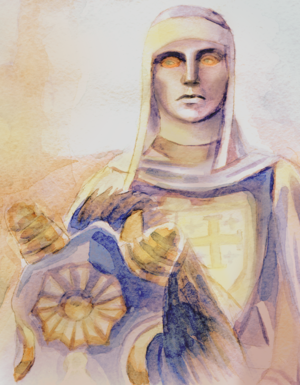Herakonoris
| Herakonoris azgo Lamati Herakonoris azgo Lamati | |
|---|---|
 Romanticized Painting of Herakonoris | |
| Born | c. March 176-165 BCE |
| Died | c. August 154-143 BCE |
| Nationality | Ohanian |
| Other names | The White Lord |
Herakonoris (Ohanian: Herakonoris) was the first recorded Ohanian King whose actions created the beginnings of the Ohanian Empire. He was noted for spreading Pauegism as well as for the mask he wore to conceal the leprosy he had contracted prior to his reign. He is credited with the creation of the Ohanian Alphabet, Elbapet or Elbapet, named after the first three letters.
Early Years
Much of Herakonoris' early years are not well known, and his birth year is not exact. It is believed his birth has to have been on a March between the years of 176 and 165 BCE. His father was believed to have been of Northern Vaniuan descent and his mother, Dzada azgo Lamati Dzada azgo Lamati, a native Ohanian noblewoman. Herakonoris' father is mentioned to have died before his birth in a dispute with nomads which his mother is claimed to have spent many nights calling for the Gods to give her son the ability to avenge her husband's death.
While still young, Herakonoris was taught at the city state's Ahmonnon Ānmonnon, where he was exposed to early Pauegist thought and a love for horseback riding. He met his close companion, Liloguz Liloguz, while competing in the annual chariot races. Their personalities complimented one another as Herakonoris was hot tempered and shrewd while Liloguz was cautious and charitable.
Upon coming of age at 16, he was legally able to inherit his father's plantation on the South side of the city. This was short lived, however, as nomads harassing the city caused the elders to institute laws meant to curb noble power while also funding their campaign against the nomads. Such a campaign, however, was an utter failure causing Herakonoris and other nobles to be infuriated by the incompetence of the elders.
Rise to Power
Herakonoris began to become centered on a plot to usurp the power of the elders but unlike the elders, the nobles had very little popularity as the citizens despised the wealth of the nobles. Herakonoris, with the help of Liloguz, decided to focus on winning popular support of the citizens by proposing several government ideas which were made to be appealing to the lower classes but not to the elders, such as an election system for tax collectors and the such, which would circumvent the elders' power while guaranteeing a less corrupt taxation system.
His ploy of gaining popular support was successful and eventually the elders offered to give him a position amongst them which he promptly refused to the surprise of many. The elders accepted his refusal and then immediately gave Liloguz the offer as well. To Herakonoris' frustration, Liloguz accepted the position.
Feeling betrayed, Herakonoris met with several peasant and merchant leaders to begin plans to overthrow the elders. To make matters worse for Herakonoris, the Elders did manage to win a dry season campaign against the Nomads in the West, giving them a spark of popularity against the nobles once more. Fearing the elders could begin consolidating its rule, he decided to begin a coup against the Elders.
Civil War
Herakonoris and several nobles, merchants, and peasants approached the city center and demanded the Elders dismiss themselves from their meeting ground. The Elders immediately reacted and had sent the militia, led by Liloguz, against them forcing Herakonoris to retreat from the city with his own rudimentary militia. Herakonoris was worried that his own forces would not be enough to win so with his own banner, he drove his makeshift force Westward to meet with the recently defeated nomads in the hopes of gaining an ally.
There, he met with Sepati, leader of the Segalos. Herakonoris was forced to allow concessions to his new ally in the aims of ensuring their loyalty in the upcoming battle but Sepati's forces provided a much needed cavalry arm to his militia force. They decided to wait until Spring to attack, knowing the city's militia would be on leave to attend their fields. Using the advantage of a superior force, he returned to Ohania.
His forces made it back to Ahtnaraldi and laid siege to the walls, locking the majority of the city militia outside its walls. This placed Herakonoris in a difficult position. He had potential enemies to his rear and one inside the city. However, his luck turned as Liloguz launched his own coup that desposed the Elders and alienated himself from the militia.
Stuck between deciding against the invaders and usurpers, the exterior militia joined Herakonoris' side. Herakonoris had not forgotten Liloguz's treachery and reentered the city when Liloguz opened the gates for his force. Liloguz had called himself king and offered to make Herakonoris his main general but as soon as this offer was made, Herakonoris' force attacked and Herakonoris himself slew Liloguz. By night the battle was over and all supporters of Liloguz were slaughtered. Herakonoris was named king and had married Sepati's only child and daughter, Somak, as a gesture of friendship and alliance.
Expansion
Herakonoris immediately consolidated his control and established a seasonal levy system that by his new law, all citizen soldiers who participated in the campaign would receive land as payment for their hardship as would their children should they be slain. It was a great scheme to build loyalty amongst his ranks as it ensured that all lands captured would be given to Ohanians and those who were captured, soldier or not, were typically enslaved by his forces. His first expansion path brought Ohania into competition with Eastern tribes but soon Ohania had spanned six major towns and cities. His expansion is not well documented as most of the records were lost to time.